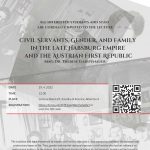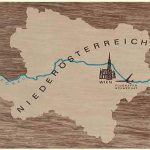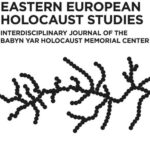 Projekt „Social mobility of elites in the Central European regions (1861-1926) and transition of imperial experience and structures in nation-states“ (Prague) (Web)
Projekt „Social mobility of elites in the Central European regions (1861-1926) and transition of imperial experience and structures in nation-states“ (Prague) (Web)
Time: 29.04.2022, 12:30 Uhr
Venue: Prague and virtual space
Link for registration (Web)
The tradition and legal framework of modern civil service stipulate a close connection between the personal and professional areas of life. Thus, gender and marital status of a person in civil service also had an influence on professional matters.
In the lecture, the traditional division of labour in civil servants‘ families will be traced to demonstrate how it became undermined with an increasing share of women in civil service since the second half of the 19th century. Drawing on exampes from disciplinary fies of the 1920s-1930s, it will be shown in how far traditional ideas about famifies were questioned or continued to exist.
Therese Garstenauer is a historian at the University of Vienna. Her areas of research are: History of Work and Livelihood, History of Government Employees, Social Studies of Social Sciences and Humanities, Gender Studies, and Geometric Data Analysis (Web). At the moment, she holds the position as a Visiting Professor at Univerzita Hradec Králové.
Monthly Archives: April 2022
CfP: Medicine, Psychiatry and Sexual Violence from the late 18th century to the present in the Global South (interdisciplinary collection); by: 16.05.2022
Adeline Moussion (Web), Emma Yapp, and Rhian Keyse (Web) (London)
Proposals by: 16.05.2022
The editors are seeking to commission chapters for an edited collection on the role of medical professionals in debates about sexual violence, to be submitted to Palgrave Macmillan’s peer-reviewed Sex and Sexualities Series. They have already received proposals for contributions from a range of scholars, however are particularly interested in commissioning work from scholars working on the Global South, to ensure that the collection has breadth as well as depth of coverage.
This interdisciplinary collection explores the role of medical professionals in debates about sexual violence. Police doctors and forensic medical examiners, GPs, gynaecologists, surgeons, nurses, midwives, prison surgeons, psychiatrists, and therapists working in all forms of institutional and community settings have been influential agents in the interpretation, medicalisation, and adjudication of sexual attacks. This is an important time to investigate the relationship between medical professionals and sexual violence. Scandals around medical and psychiatric responses to sexual abuse emerge on a regular basis (viz. Nauru detention camp; the abuse of people in psychiatric wards, prison, and detention camps; failures to send the biological samples from ‚rape kits‘ for forensic examination; complaints about medical examinations; popular anxieties about the medical treatment and rehabilitation of violent offenders).
The editors invite submissions from scholars working on the Global South, and from any humanities/arts/social science discipline (e.g. history, sociology, law, philosophy, medical humanities, anthropology, art and visual culture.). The emphasis is on any period from the late 18th century to the present. They welcome proposals from graduate researchers and early career scholars as well as those more established in their field. Co-written submissions are welcome.
Areas of interest include, but are not limited to:
- The role of medicine and psychiatry in understanding, interpreting, facilitating, treating, prosecuting, and preventing sexual violence.
- Medical jurisprudence and forensic medicine in relation to sexual violence.
- The training of medical professionals in how to respond to people reporting sexual assault.
- Psychiatric classifications of perpetrators of sexual violence. Continue reading
Vortragsreihe: Geschlecht – Macht – Geschichte. Perspektiven aus dem östlichen Europa, 04-07.2022, Leipzig und virtueller Raum
 Leibniz-Institut für Geschichte und Kultur des östlichen Europa (GWZO) (Web)
Leibniz-Institut für Geschichte und Kultur des östlichen Europa (GWZO) (Web)
Zeit: mittwochs, 17.00 Uhr
Ort: Leipzig und virtueller Raum
Die Reihe gibt Einblicke in Themen, Errungenschaften und Potenziale der Geschlechterforschung im östlichen Europa. Alle Vorträge finden als hybride Veranstaltung statt.
Programm (PDF)
- 13.04.2022: Dietlind Hüchtker (Univ. Wien): Geschlechtergeschichte/Gender Studies: Wissenschaft, Politik und die Notwendigkeit des Vergessens
- 27.04.2022: Rasa Navickaite (Univ. of Vienna): In Search of Old Europe: Radical Feminism, Lithuanian Nationalism, and Marija Gimbutas‘ Archaeological Work
- 04.05.2022: Susanne Jaeger (GWZO Leipzig): Frauen als Akteurinnen im Dreißigjährigen Krieg. Die Bildnispolitik der ‚Winterkönigin‘ Elisabeth Stuart
- 18.05.2022: Maren Röger (GWZO Leipzig): Macht und Geschlecht: Eine überfällige Geschichte der deutschen Besatzung Polens 1939–1945
- 01.06.2022: Roberto Kulpa (Edinburgh Napier Univ.): Thinking about the geo-politics of knowledge production: Non-anglophone epistemologies in/of Queer Studies
- 15.06.2022, 19.00 Uhr: Podiumsdiskussion: Eine rasante Geschlechtergeschichte. Vom Staatsfeminismus zum Antigenderismus – mit Anna Artwinska (Univ. Leipzig), Peter Hallama (Univ. Bern), Teresa Kulawik (Södertörn Univ., Stockholm) und Martina Rellin (freie Journalistin und Autorin) – Moderation: Beáta Hock (GWZO Leipzig)
- 29.06.2022: Susan Zimmermann (Central European Univ., Vienna): Aktivismus im Staat? Gewerkschaftsfunktionärinnen und die Politik der Frauenarbeit im staatssozialistischen Ungarn
- 13.07.2022: Gasan Gusejnov (Briva Univ., Lettland): Feminitiva in Massenmedien und im Fachdiskurs des heutigen Russlands
Konzeption und Organisation: Beáta Hock, GWZO-Abteilung »Verflechtung und Globalisierung«, Karin Reichenbach, GWZO-Abteilung »Kultur und Imagination« in Zusammenarbeit mit Ewa Tomicka-Krumrey Continue reading
Veranstaltungsreihe: Queer-historische Auseinandersetzungen mit dem Nationalsozialismus, 04-06.2022, Wien
 Geh Denken! Veranstaltungsreihe des Vereins GEDENKDIENST im Sommersemester 2022 (Web)
Geh Denken! Veranstaltungsreihe des Vereins GEDENKDIENST im Sommersemester 2022 (Web)
Im Resselpark am Wiener Karlsplatz wird das erste Wiener Denkmal für aus heutiger Perspektive queere Menschen entstehen, die Opfer nationalsozialistischer Verfolgung waren. Damit wird eine historisch-politische Leerstelle in Wien geschlossen. Lange dauerte es, bis sich eine Öffentlichkeit fand, die zum Gedenken an queere Menschen bereit ist.
Diese Leerstelle kennzeichnet den Diskurs über den NS weit über den Resselpark hinaus: In Gedenkstätten, Museen, Schulbüchern, Archiven und in der Wissenschaft wird die Geschichte queerer Menschen selten explizit berücksichtigt. Im Zuge des Projektes Überque(e)rung eines Kontinents steuert die Reihe Geh Denken! bewusst gegen den heteronormativen Charakter vieler Narrative zum Nationalsozialismus und legt einen Schwerpunkt auf Queer History.
Programm (als PDF)
Kim Dresel und Katharina Menschick: Vom Suchen und Finden – Queer History in den Arolsen Archives
- Di., 26.04.2022, 19:00 Uhr; Ort: DEPOT, Breite Gasse 3, 1070 Wien
- Kim Dresel arbeitet als wissenschaftliche Mitarbeiterin in der Archivischen Erschließung der Arolsen Archives (Web) und lehrt Archivwissenschaften an der Fachhochschule Potsdam.
- Katharina Menschick arbeitet als wissenschaftliche Mitarbeiterin in der Abteilung Forschung und Bildung der Arolsen Archives (Web).
Birgit Pichler und Louise Beckershaus: Historisch nicht relevant? Feministische und geschlechterbewusste Annäherungen an den Ort des ehemaligen KZ Mauthausen-Gusen
- Mi., 18.05.2022, 19:00 Uhr; Ort: Republikanischer Club, Fischerstiege 1-7, R1, 1010 Wien
- Birgit Pichler arbeitete viele Jahre als Guide an der Gedenkstätte Mauthausen-Gusen und für den Verein erinnern.at. Seit 2019 ist sie als Pädagogin in der Lernwerkstatt Brigittenau tätig.
- Louise Beckershaus arbeitete als Guide an der Gedenkstätte Mauthausen-Gusen und für den Verein erinnern.at. Seit 2018 ist sie Teil des Vermittlungsteams des Hauses der Geschichte Österreich.
Filmvorführungen: Loving Highsmith (CH/D 2022), 09.-11.04.2022, Wien
 Filmcasino: Filmhaus (Web)
Filmcasino: Filmhaus (Web)
Ab: 09.-11.04.2022
Termine: Link
Ort: Filmhaus, Spittelbergg. 3
Beschreibung: Mit Romanen wie „Zwei Fremde im Zug“ und „Der talentierte Mr. Ripley“ hat Patricia Highsmith Weltliteratur geschaffen. Ihr Privatleben hat sie jedoch zeitlebens vor der Öffentlichkeit verborgen. Dass sie lesbisch war, wusste nicht einmal ihre Familie in Texas. Ihren lesbischen Liebesroman „Carol“ schrieb sie unter einem Pseudonym.
Nur Patricia Highsmiths Tage- und Notizbücher verraten etwas über ihr bewegtes Liebesleben. Diese wurden nach ihrem Tod in einem Wäscheschrank in ihrem Haus im Schweizer Tessin entdeckt. Die Aufzeichnungen wurden im Herbst 2021 zum 100. Geburtstag der Autorin zum ersten Mal veröffentlicht. Auf dieser Basis erzählt Regisseurin Eva Vitija von Patricia Highsmiths Lieben und Leidenschaften. Vitijas vielschichtige Liebesbiografie führt uns in ein Reich der Sehnsüchte und Obsessionen – und wirft ein neues Licht auf eine der schillerndsten Autorinnen des 20. Jahrhunderts. LOVING HIGHSMITH ist aber auch das Porträt einer Generation von Frauen, die mit Highsmiths „Carol“ den Mut fand, für ihr Recht auf Liebe zu kämpfen.
Film: LOVING HIGHSMITH; R: Eva Vitija, CH/D 2022, 1 Std. 24 Min., deutsche Fassung, teilweise mit dt. UT
– –
Der Film steht auch im Votiv Kino in Wien am Programm. Dazu gibt es derzeit noch keine fixen Termine (Web).
CfP: Gender, Society, and Networks between 1750 and 1820: Maria Carolina of Naples-Sicily (Event, 09/2022, Innsbruck); by: 30.04.2022
 Ellinor Forster, Institut für Geschichtswissenschaften und Europäische Ethnologie, Univ. Innsbruck (Web)
Ellinor Forster, Institut für Geschichtswissenschaften und Europäische Ethnologie, Univ. Innsbruck (Web)
Time: 08.-09.09.2022
Venue: Innsbruck
Proposals by: 30.04.2022
The Habsburg queen of Naples-Sicily, Maria Carolina (1752-1814), navigated a life marred by revolutionary social upheaval, geopolitical restructuring, dynastic competition, and concurrent personal tragedies and triumphs. As a foreign consort to the Bourbon monarch of Naples-Sicily, she encountered xenophobic hostility and countless challenges to her influence at court. As a reform-minded individual, she helped to enact wide-ranging alterations to society and state in southern Italian world. As a thrice-exiled figurehead, she experienced first-hand the harsh difficulties of political instability and contested legitimacy. And, as a queen she employed her position as a power to shape the fortunes and paths of dynasties across Europe. More than a mere ‘arch rival’ to Napoleon Bonaparte, Maria Carolina represents the myriad experiences of a female ruler during a period of dynamism and irrevocable change.
We see Queen Maria Carolina of Naples-Sicily as a prism, or more precisely as an intersection of overlapping crossovers that enables us to contextualise broadly defined social, economic, and political developments of the late 18th and early 19th centuries. This crossover should be analysed both vertically – through social hierarchies – as well as horizontally across geographic regions throughout Europe in this period. In this context, Maria Carolina of Naples-Sicily serves as a primary starting point and as a model for wider considerations of rulership, gender, societal change, familial status, and political participation as well as geopolitical shifts and dynastic integration and competition. The organizers therefore seek to address the following themes and questions:
Gender
- To what extent did the reformist efforts of Maria Carolina and Ferdinand IV reflect the wider application of enlightened ideals within European states? In what ways did social structures in the kingdoms of Naples and Sicily alter between 1750 and 1820? How much of this change should be attributed to the ruling elites and monarchs themselves both in Naples-Sicily and, comparatively, across Europe?
- In terms of pace such industrialisation or revolutionary waves … read more and souce Web.
CfP: Families in Transit: Child-bearing, Child-rearing and Inheritance during Displacement (Event, 09/2022, Leiden); by: 01.05.2022
Leiden University; Sarah A. Cramsey (Web)
Time: 21.-23.09.2022
Leiden University
Proposals by: 01.05.2022
Stories about refugees are almost always stories about families. From ancient times when deportations accompanied military defeats to the modern migrations unleashed by conflict, persecution and climate change, children within displaced families have continuously demanded care. And yet, the archival record and the narratives drawn from it rarely capture the seemingly “invisible” work performed by biological and circumstantial caregivers during periods of displacement. Further, while it is clear that child-bearing and caretaking are timeless enterprises, deep lacunae remain around these historical subjects more generally. Diapers necessarily leave different kinds of cloth and paper trails. How does a focus on growing families as well as the individuals and entities who care for them change our understanding of displacement, migration and the complex feelings of belonging to a specific religious, ethnic or cultural “diaspora”?
This conference, Families in Transit, makes the “invisible” work that accompanies children and continues during periods of displacement “visible” across space and historical time. Drawing on multidisciplinary perspectives, the goal of this meeting is to illuminate the connections and disconnections between displaced families within different historical and contemporary contexts, like: deported populations in the Ancient Near East; indigenous peoples in North America; families with Nansen passports after WWI; Polish Jews who survived World War II and Holocaust in the Soviet Union; displaced people with Greek citizenship; families uprooted during and after the breakup of Yugoslavia in the 1990s and the dissolution of Mandate Palestine in the 1940s as well as Syrian and Ukrainian parents and their children who have been displaced more recently, over the last decade and up until today.
This conference is sponsored by the Royal Academy of The Netherlands (KNAW) which awarded the organizer an Early Career Partnership for this initiative in 2021. Read more and source … (Web).
Konferenz: LandUmStadt. 100 Jahre Trennung von Wien und Niederösterreich, 28.04.2022, St. Pölten
 NÖ Landesarchiv, NÖ Landesbibliothek und Institut für Geschichte des ländlichen Raumes in Koop. mit dem Verein für Landeskunde von NÖ (Web)
NÖ Landesarchiv, NÖ Landesbibliothek und Institut für Geschichte des ländlichen Raumes in Koop. mit dem Verein für Landeskunde von NÖ (Web)
Zeit: Do., 28.04.2022, 09:30-16:30 Uhr
Ort: NÖ Landesbibliothek, St. Pölten
Anmeldung: bis 25.04.2022
Wien und Niederösterreich, seit Jahrhunderten eine Einheit, gingen seit 1922 als selbstständige Bundesländer getrennte Wege. Gleichzeitig blieben zahlreiche Verbindungen aufrecht; man war auch weiterhin aufeinander angewiesen. Am Beispiel von Niederösterreich und Wien behandelt die international besetzte Tagung die Vielfalt und historische Dynamik von Stadt-Land-Beziehungen im 20. und frühen 21. Jhd.
Um der interdisziplinären Herausforderung des Themas gerecht zu werden, wurden Referent:innen aus den Disziplinen der Sozial- und Kulturgeschichte von Stadt und Land, der Verfassungs- und Verkehrs-, der Frauen- und Geschlechtergeschichte, der historischen Demographie und der Europäischen Ethnologie gewonnen. Die historischen und gegenwärtigen Erfahrungen mit Trennung und Kooperation ermöglichen einen konkreten Vergleich mit der Region Basel .
Programm
- 9:30 Uhr: Begrüßung: Roman Zehetmayer, Leiter NÖ Landesarchiv u. Landesbibliothek; Grußworte: LR Ludwig Schleritzko
- 10:00 Uhr: Clemens Zimmermann (Univ. des Saarlandes): Niederösterreich – Vom Hinterland zur polyzentrischen Stadtregion
- 10:45 Uhr: Karl Lengheimer: Die Trennung und was in hundert Jahren daraus wurde
- 11:15 Uhr: Daniel Kriemler u. Andre Salvisberg (Univ. Basel): Einheit, Trennung, Partnerschaft: Stadt und Landschaft Basel 1830–2020
11:45 Uhr: Mittagspause
- 13:30 Uhr: Gabriella Hauch (Univ. Wien) „Da war Wien und da das restliche Österreich?“. Zum Geschlecht des Politischen in den 1920er Jahren im Spannungsfeld von Zentrum und Peripherie/Metropole und Provinz
- 14:00 Uhr: Brigitta Schmidt-Lauber (Univ. Wien): Stadt-Land-Beziehungen. Transformationen gesellschaftlicher Lebensverhältnisse Continue reading
Filmvorführung: Female Subversion Is Here to Stay, 17.04.2022, Wien
 Österreichisches Filmmuseum: Reihe Amos-Vogel-Atlas (Web)
Österreichisches Filmmuseum: Reihe Amos-Vogel-Atlas (Web)
Zeit: So., 17.04.2022, 15:00 Uhr
Ort: Österreichisches Filmmuseum, Augustinerstr. 1, 1010 Wien
„Im Februar 1946 buchte die Regisseurin Maya Deren (Eleanora Solomonovna Derenkovskaya, 1917-1961) das Kino Provincetown Playhouse in Greenwich Village in New York City und zeigte unter dem Titel ‚Three Abandoned Films‘ ihre Filme Meshes of the Afternoon (1943), At Land (1944) und A Study in Choreography for Camera (1945). Diese Aufführung inspirierte den aus Wien gebürtigen Exilanten Amos Vogel (1921–2012) zur Gründung seines Filmclubs ‚Cinema 16‘.“
In „Female Subversion Is Here to Stay“ werden Maya Derens Avantgardefilm-Klassikern Arbeiten der zeitgenössischen österreichischen Filmemacherinnen Sabine Marte und Mara Mattuschka gegenübergestellt.
In deren Anwesenheit werden folgende Filme gezeigt:
- Meshes of the Afternoon. Ein Film von Maya Deren; Kamera: Alexander Hammid. US, 1943, 16mm, sw, 14 min
- Ritual in Transfigured Time. Regie + Drehbuch: Maya Deren; Kamera: Hella Heyman; Schnitt: Alexander Hammid, Maya Deren; mit: Rita Christiani, Maya Deren, Anaïs Nin und Frank Westbrook. US, 1945/46, 16mm, sw, 14 min
- Do we need to have an accident? Sabine Marte. AT, 2011, DCP, Farbe, 4 min
- b-star, untötbar! Text-Performance + Film von Sabine Marte. AT, 2009, DCP, 3 min/7 min
- You Come. Musik: Pendler; Video: Oliver Stotz. AT, 2007, 4 min
- Step behind the ropes, please! nr. 2: Live-Performance von Sabine Marte. 15 min
- Unternehmen Arschmaschine. Regie, Drehbuch: Mara Mattuschka, Gabriele Szekatsch; Kamera: Alexandra Brandt. AT, 1997, 16mm, sw, 17 min
- Comeback. Ein Film von und mit Mara Mattuschka. AT, 2005, DCP, sw, 15 min
Die Reihe „Amos-Vogel-Atlas“
Amos Vogel hat sich Zeit seines Lebens der Suche nach Subversion im Film gewidmet. Nach der Emigration in die USA Continue reading
CfP: Book Reviews in the Eastern European Holocaust Studies (A new online journal from Kiev in Ukraine); by: –
 Eastern European Holocaust Studies (Web)
Eastern European Holocaust Studies (Web)
In October 2021, the Babyn Yar Holocaust Memorial Center in Kiev (Web) founded the academic online journal „Eastern European Holocaust Studies“. It is published by De Gruyter and is the first peer-reviewed journal in Ukraine.
The editorial board is international, Andrea Petö (Vienna/Budapest) is Editor-in-Chief. Eleonore Lappin-Eppel (Vienna) is responsible for the book reviews. She therefore invites researchers to write reviews for this new journal. More information and the submission guidelines can be found here (Web).
Due to the belligerent attacks on Ukraine, it is an act of solidarity for the members of the editorial board to ensure the publication of the journal. If you have any questions, please write to Eleonore Lappin-Eppel at eleonore.lappin@chello.at.
About the Journal
Eastern European Holocaust Studies: Interdisciplinary Journal of the BYHMC provides an outlet for researchers dealing with the history of the Holocaust and the Second World War in Central and Eastern Europe – and as such, aims to contribute to the incorporation of both the modern and contemporary history of this territory and the topic of the aftermath of the war into the international academic scene. While research on conflict and genocide in Eastern Europe has become increasingly prevalent, only a handful of scholars have dealt with post-war issues connected to the Holocaust and the war, therefore the editorial team aims at inspiring new investigations and publications on these topics.
Eastern European Holocaust Studies is a peer-reviewed bi-annual multidisciplinary scholarly journal, which aims to be a major international forum for publishing theoretically sophisticated, and empirically grounded original research in the intersection of media studies, memory studies, gender studies, historical and sociological research, literary science, as well as war studies and Holocaust and Genocide Research, and so forth. Submissions should be original contributions and not under simultaneous consideration for other publications. The editors will preferably accept the proposals with an interdisciplinary approach.
